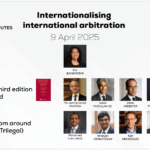
In his 2007 Course at the Hague Academy1, the late Professor Gaillard observed that international arbitration is increasingly recognised as a transnational system of justice. Building on Professor Gaillard’s legacy, Gaillard Banifatemi Shelbaya Disputes organised a conference on “The Internationalisation of International Arbitration” at the 2025 edition of the Paris Arbitration Week. Over the course of two panels, the conference considered how international arbitration has evolved over the past 20 years – continued internationalisation or increasing idiosyncrasies and parochialism?
The first panel launched the third edition2 of the canonical commentary “Mustill & Boyd on Commercial and Investor State Arbitration” in Paris, and featured contributions by three of the book’s authors:
Mr Justice David Foxton, Judge of the King’s Bench Division of the High Court of England and Wales, examined the well-known distinction between jurisdiction and admissibility as applied in the context of investment-treaty arbitration and questioned its utility for common law courts dealing with international commercial arbitration. In doing so, Justice Foxton drew on case law from the courts of Australia, England & Wales, Hong Kong and Singapore to suggest that the distinction may not be a sound one – at least in the context of the common law – and may either be little more than a “slogan […] attached to issues we have been deciding without difficulty for years” or a means of “obscuring policy-driven interpretive presumptions as to the effects of the parties’ agreement”.
Salim Moollan KC, of Brick Court Chambers, tackled the issue of applicable law in international arbitration, using as his launchpad the UK Supreme Court decision in Enka v Chubb to conduct a sweeping analysis of developments in English, French and Singaporean jurisprudence. In doing so, Moollan questioned whether the UK Supreme Court’s application of traditional conflict of law principles to determine the law applicable to the arbitration agreement (in Enka) or the Singapore Court of Appeal’s development of the so-called “double arbitrability test”, whereby a dispute must be arbitrable under both the law governing the arbitration agreement and the law governing the seat of arbitration (in Anupam Mittal), was consistent with avowed pro-arbitration policies in either jurisdictions.
Finally, Peter Webster, of Essex Court Chambers, addressed the issue of transnational issue estoppel, examining the extent to which courts in Australia, England and Singapore have understood and incorporated the concept into their judgments as a means of promoting finality in international commercial dispute resolution and preventing transnational relitigation.
Professor Philippe Stoffel-Munck, of Panthéon-Sorbonne University (Paris I), provided a response to the three authors, drawing on the civil law, and in particular the French tradition, to address each of their contributions.

Yas Banifatemi, Mr Justice David Foxton, Salim Moollan KC,
Peter Webster and Professor Philippe Stoffel-Munck






The second panel, organised with the Indian firm Trilegal, approached the topic of the internationalisation of international arbitration through a range of different perspectives.
Mohamed Shelbaya, a founding partner at Gaillard Banifatemi Shelbaya Disputes, kicked things off with a broad-ranging examination of the manner in which the common law and civil law traditions can influence each other in international arbitration. In doing so, Shelbaya distinguished between cross-pollination – i.e. the use of one system of law to enhance another without fundamentally altering either system – and acculturation, where one system of law views the other in its own image, with a loss of what makes that system distinct, and correspondingly negative results for the correct resolution of the parties’ dispute.
Niranjan Venkatesan KC, of One Essex Court, examined divergent approaches to the interaction between arbitration and insolvency law within the common law universe, using as his starting point the Privy Council decision in Sian Participation Corp. Venkatesan suggested that that decision may not be correct, questioning the circumstances in which a winding-up petition should be stayed in the face of an arbitration agreement.
Karl Hennessee, SVP Litigations & Investigations at Airbus, focused his remarks on the opportunities – and threats – posed by the rise of artificial intelligence in international arbitration. Unless arbitration lawyers embraced the new technology, Hennessee warned, clients would look for technology-based workarounds that could save time and cost, democratising the arbitration landscape, albeit with initially uneven results.
Anuj Berry, partner at Trilegal, provided brief closing remarks.
Both panels were moderated by Yas Banifatemi, a founding partner at Gaillard Banifatemi Shelbaya Disputes.

Yas Banifatemi, Mohamed Shelbaya, Niranjan Venkatesan KC,
Karl Hennessee and Anuj Berry







1. To find out more about Emmanuel Gaillard’s writings, and in particular his 2007 Course at the Hague Academy, Legal Theory of International Arbitration (Martinus Nijhoff, 2010), please refer to his extensive bibliography.
2. Coming 36 years after the publication of its previous edition, and 24 years after the 2001 companion guide, the latest edition of Mustill & Boyd promises to become a canonical text, and an indispensable guide to students and practitioners of international arbitration around the world: Foxton, D. et al. (2024) Mustill & Boyd: Commercial and investor state arbitration. London: LexisNexis.
